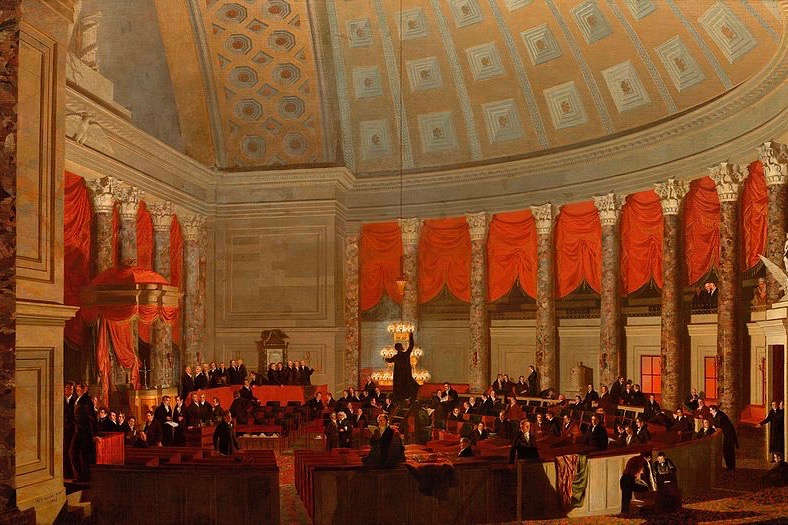Table Of Content

Cabinet officers and other officials are frequently summoned before the committees to explain policy. The Constitution (Article I, section 6) prohibits members of Congress from holding offices in the executive branch of government—a chief distinction between parliamentary and congressional forms of government. It has meant that once a decade, states have had to face the prospect of joining a list of winners and losers after those House seats are reshuffled based on how the states' latest census population counts rank. How those seats are reassigned also plays a key role in presidential elections. Each state's share of Electoral College votes is determined by adding its number of House seats to its two Senate seats.
Votes on the Foreign Aid Bills
One example of a provision repeatedly supported by the House but blocked by the Senate was the Wilmot Proviso, which sought to ban slavery in the land gained during the Mexican–American War. Conflict over slavery and other issues persisted until the Civil War (1861–1865), which began soon after several southern states attempted to secede from the Union. The war culminated in the South's defeat and in the abolition of slavery. All southern senators except Andrew Johnson resigned their seats at the beginning of the war, and therefore the Senate did not hold the balance of power between North and South during the war. Holding the votes was an act of defiance by Johnson against an outspoken faction of conservative rebels who oppose funding for Ukraine and pushed him not to bring it to a vote.
House Republicans will face one-vote majority as Rep. Mike Gallagher plans exit - Axios
House Republicans will face one-vote majority as Rep. Mike Gallagher plans exit.
Posted: Fri, 22 Mar 2024 07:00:00 GMT [source]
More House History
Immediately after the bill passed, ZelenskIy released a statement expressing his gratitude to both parties “and personally Speaker Mike Johnson for the decision that keeps history on the right track”. As a result of his move, Johnson could face a vote on his ouster in the coming weeks. The GOP speaker, however, has grown more willing to confront the threat from the right, and Democrats have suggested that they're willing to protect him from an ouster effort if he allowed a vote on Ukraine aid. In the two years since Russia's invasion, opposition to aiding Ukraine has grown from a fringe position to a majority view among House GOP lawmakers. Many argue the money should be spent domestically or that policy changes at the US-Mexico border should take precedence.
Checks and Balances in Congress
The number of voting representatives in the House is fixed by law at no more than 435, proportionally representing the population of the 50 states. Currently, there are five delegates representing the District of Columbia, the Virgin Islands, Guam, American Samoa, and the Commonwealth of the Northern Mariana Islands. In most states, major party candidates for each district are nominated in partisan primary elections, typically held in spring to late summer. Exceptions can result in so-called floor fights—convention votes by delegates, with outcomes that can be hard to predict. Especially if a convention is closely divided, a losing candidate may contend further by meeting the conditions for a primary election. The courts generally do not consider ballot access rules for independent and third party candidates to be additional qualifications for holding office and no federal statutes regulate ballot access.
Government Oversight
The Israel bill includes about $4.4bn to replenish depleted US supplies given to Israel; $4bn for missile defense, including the much-vaunted Iron Dome, and $1.2bn for the Iron Beam; and $3.5bn to help Israel buy weapons. There are also provisions to make it easier to supply Israel with US munitions held in other countries. Voting began hours ahead of schedule in an extraordinary Saturday session that delayed the House’s planned recess. The House erupted into applause when the Ukraine bill passed, with the chair, Marc Molinaro of New York, admonishing members not to wave Ukrainian flags.
Representatives by Party
The allocation of seats is based on the population within the states, and membership is reapportioned every 10 years, following the decennial census. House members are elected for two-year terms from single-member districts of approximately equal population. Whether working on Capitol Hill or in his / her congressional district, a representative’s schedule is extremely busy. Often beginning early in the morning with topical briefings, most representatives move quickly among caucus and committee meetings and hearings. They vote on bills, speak with constituents and other groups, and review constituent mail, press clips and various reports.
Historical district boundaries
Majority of House Democrats, Led By Jewish Members, Unified Behind President Biden's Leadership in the Middle East - Jerry Nadler
Majority of House Democrats, Led By Jewish Members, Unified Behind President Biden's Leadership in the Middle East.
Posted: Fri, 20 Oct 2023 07:00:00 GMT [source]
House were held on November 3, 2020, and coincide with the 2020 presidential election. Special elections will be held during the 118th Congress to replace members of Congress who leave office for any reason. During debates, a member may speak only if called upon by the presiding officer.
From "How much does the president make?" to "How many amendments are there?" to "What is an oligarchy?" – we're striving to find answers to the most common questions you ask every day. The Vice President of the United States serves as President of the Senate and may cast the decisive vote in the event of a tie in the Senate. HISTORY.com works with a wide range of writers and editors to create accurate and informative content.
Work can continue into the evening with receptions or fundraising events. Before members are assigned to committees, each committee’s size and the proportion of Republicans to Democrats must be decided by the party leaders. The total number of committee slots allotted to each party is approximately the same as the ratio between majority party and minority party members in the full chamber. The House also has one permanent committee that is not a standing committee, the Permanent Select Committee on Intelligence, and occasionally may establish temporary or advisory committees, such as the Select Committee on Energy Independence and Global Warming.
If they do, the bill does not become law unless each House, by a two-thirds vote, votes to override the veto. The approval of the Senate and the House of Representatives is required for a bill to become law. Both Houses must pass the same version of the bill; if there are differences, they may be resolved by a conference committee, which includes members of both bodies. For the stages through which bills pass in the Senate, see Act of Congress.
The number of seats in the House was expanded to 105 members after the 1790 Census, and then to 142 members after the 1800 headcount. The law that set the current number of seats at 435 took effect in 1913. But it isn't the reason the number of representatives has been stuck there. Still, Anderson, the census historian, says she's concerned about how representative the House actually is at this unchanging size. A century ago, there was one member for about every 200,000 people, and today, there's one for about every 700,000. While those kinds of arguments against making the House bigger were not new, they won out in 1929, when Congress passed the law that set up an automatic process for reapportioning the House based on the existing number of seats.
The House has several powers assigned exclusively to it, including the power to initiate revenue bills, impeach federal officials, and elect the President in the case of an Electoral College tie. Usually, these committees will make recommended changes to these pieces of legislation, before voting on whether or not to forward them to the entire House of Representatives or Senate for a vote. Interestingly, although the Senate is sometimes referred to as the “upper body,” and the House as the “lower body,” the two legislative bodies hold the same amount of power within the U.S. system. Both must agree to, vote on and adopt pieces of identical legislation (known as bills) in order for the legislation to become law. The number rose following the ratification of the Constitution by North Carolina and Rhode Island in 1790; the first Congress (1789–91) adjourned with 65 representatives.
This latter committee, created in the 110th Congress and reauthorized for the 111th, has no jurisdiction over legislation and must be chartered anew at the start of every Congress. The House also appoints members to serve on joint committees, which include members of the Senate and House. Some joint committees oversee independent government bodies; for instance, the Joint Committee on the Library oversees the Library of Congress. Other joint committees serve to make advisory reports; for example, there exists a Joint Committee on Taxation. Hence, the power of joint committees is considerably lower than those of standing committees. The House is also served by several officials who are not members.

When the presidency and Senate are controlled by a different party from the one controlling the House, the speaker can become the de facto "leader of the opposition". Some notable examples include Tip O'Neill in the 1980s, Newt Gingrich in the 1990s, John Boehner in the early 2010s, and Nancy Pelosi in the late 2000s and again in the late 2010s and early 2020s. Since the speaker is a partisan officer with substantial power to control the business of the House, the position is often used for partisan advantage. After the whips, the next ranking official in the House party's leadership is the party conference chair (styled as the Republican conference chair and Democratic caucus chair). Representatives and delegates serve for two-year terms, while a resident commissioner (a kind of delegate) serves for four years. The U.S. Constitution requires that vacancies in the House be filled with a special election.
The whip’s official role is to count potential votes for bills being debated for the party leaders. The House Majority Leader—who is also chosen from among the membership of the political party with the most seats in the House—schedules time for floor debate on legislation and sets the legislative strategy for the party in control. In the House of Representatives, the legislative schedule (which defines when bills are debated and voted upon) is set by the body’s leader, known as the Speaker of the House. The Speaker, who is chosen among the membership of the political party with the most seats in the House, establishes the legislative priorities for the body and presides over the deliberation of bills under consideration. The United States is also divided into 435 congressional districts with a population of about 760,000 each.
The opposition to the Israel aid represented a minority of Democrats, but reflected the deep resistance to unconditional aid and the divisions in the party on Gaza. Representative Jamie Raskin of Maryland represented a notable new “no” vote among Democrats, and other standouts included Representatives Donald S. Beyer Jr. of Virginia, Earl Blumenauer of Oregon and John Garamendi of California. Both chambers of Congress have extensive investigative powers, and may compel the production of evidence or testimony toward whatever end they deem necessary. Members of Congress spend much of their time holding hearings and investigations in committee. Refusal to cooperate with a congressional subpoena can result in charges of contempt of Congress, which could result in a prison term.

No comments:
Post a Comment